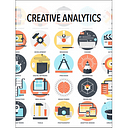Westworld Dives Into Data
Season Two is full of new perspective but often confusing context
- *This article is NOT Spoiler-free, but contains as few as possible and few if any beyond episode 2.
There is a certain symmetry to this article — the spoiler alert is identical to my last offering on Westworld. There must just be something about episode two of each season. Truth is, I am running a few episodes behind this year.
Let’s start with a couple of thoughts. Given where season one ended, it was great to see Jimmi and Ben back on the screen. Better still to be given a glimpse into the original dynamics and thoughts that led to the “funding” of Westworld.
So why the quotes? Well, sorry to all those who want to suspend disbelief but those flashbacks did not align with the story to-date. The technology was far advanced of where it should have been OR Westworld had already been destroying the portfolios of the world’s VC for decades. Either is difficult to fathom if you try too hard — so don’t. Enjoy the tail.
With as profound as Hopkin’s Ford may have been, this article is about William. For my money, he is even more profound. That pun will resonate in a bit…
Season One gave us:
I used to think this place was all about pandering to your baser instincts. Now I understand. It doesn’t cater to your lowest self, it reveals your deepest self. It shows you who you really are.
Season Two went one better:
You’re right. This place is a fantasy. Nothing here is real.
Except one thing: The guests.
Half of your marketing budget goes to trying to figure out what people want. Because they don’t know.
But he wasn’t done:
But here, they’re free. Nobody’s watching. Nobody’s judging. At least that’s what we tell them. This is the only place in the world where you get to see people for who they really are. And if you don’t see the business in that, then you’re not the businessman that I thought you were.
What a cheeky little… well, genius really. For those just catching up, William has put his finger upon what may be “the most fantastic concept in data monetization ever”. I used a lot of emphasis here. Let’s break it down.
For starters, let’s be clear — this is fantasy. I was waiting in season one to hear anyone ask — “what if they are recording this?”. I mean, they so clearly were. Yet, none of the guests seemed to think about it. Fantastic again, because so many guests would — ask that is. Though I am sure not all and maybe not even half. Then again — it would only need one congressional hearing or advocacy group. I don’t think the season two plug of this park potentially being Asia is likely to change that.
Next up — I have been privy to a lot of data monetization schemes. A damn lot. I will give Ford, Bernard, and William their due — they are at least collecting some very interesting and powerful data. But the monetization element is quite unclear and so far Season Two is going in the most obvious direction — blackmail. That is a crime… not a marketing strategy (perhaps in Asia? I digress… while others transgress… that is becoming a theme).
Finally, while I agree that this an interesting perspective on uncovering the truth of human behavior — a statement true of this whole story as well as William’s genius plan — I am not sure this is any more real. All of this becoming a Strange Loop, but seriously “are the guests of Westworld truly divulging their inner truths?” The only honest answer is Maybe.
I suppose it all comes back to the initial quote that set Westworld in motion. Karl Popper would appreciate it. Truth is only that which can not be disproved… yet.
And so there is one final experiment we will need to see. Would William’s data truly be meaningful? Would having insight into the “honest” behavior of a guest engaged in what they “know” is a sci-fi theme park production valuable? For marketing? For understanding? For whatever?
Can you really see truth of the actor in a fake environment? Even if the actors occasionally lapse in their own beliefs, I think that is taking a lot for granted.
William is making a lot of rookie mistakes, but then we have no reason to believe he has any real discipline in analytics or behavioral science. All we know is that he is one hell of a strategist. While Westworld and the real world tends to conflate those things — reality is far less forgiving.
Westworld is television fiction. I used it here for inspiration. Despite the flaws, it is compelling and engaging. I plan to keep watching it. But I do offer a lesson:
You can’t ignore or fake context and still pretend you have better data.
William has created a different perspective, not necessarily a better one. It will be interesting to see where this story goes. Thanks for reading!
Go back to Season One — well, our take on it:

